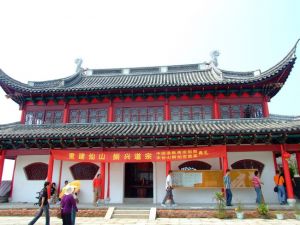Tongbai Gong of Southern Lineage
Tongbai Gong (桐柏宫 Palace of Tung and Cypress Trees) is located on Mount Tiantai (Heavenly Terrace Mountain) in Zhejiang Province. Zhang Boduan, founder of the Jindan Nanzong (Southern Lineage of Golden Elixir) Daoism and a native of Tiantai, used to practice Daoism in Tongbai Palace. Therefore, later generations revered it as the ancestral temple of the Southern Lineage.
The Southern Lineage of the Golden Elixir sect, a Daoist Inner Alchemy sect that took shape during the Southern Song Dynasty (1127-1279), originated in the regions south of the Yangtze River in contrast with Quanzhen (Complete Perfection) Daoism’s origins in north China, hence the Southern Lineage name. Zhang Boduan of the Northern Song Dynasty (960-1127) was regarded as the school’s founder. The doctrines were passed in a single line of descent from Zhang Boduan to Shi Tai, to Xue Daoguang, to Chen Nan and to Bai Yuchan.
Zhang Boduan was also called Yongcheng and his literary name was Pingshu and his Daoist monastic name Ziyang. He liked eating fish when he was a government official. One day, his servant sent him his meal while he was working at the local authority. His colleagues hid his favorite fish to play a joke on him. Failing to find the fish, he suspected that the servant had stolen it. The servant eventually hanged himself, dying without having been cleared of the mistaken charge. Several days later, worms suddenly fell from a beam in the local authority building. They were maggots that had grown out of the rotten fish hidden there. Too late for regrets, Zhang Boduan realized that he must have handled quite a few similar unjust cases at the local authority, so he composed this poem:
Writing indictments or appeals for 40 years, I have experienced numerous rights and wrongs.
My family has enough to eat and wear, but thousands of others are resentful.
The faults of my official career of half a lifetime will influence a hundred generations.
Giving up the purple ribbon and golden medal, I wander leisurely in straw sandals and with an iron stick.
When asked where immortals live, I replied they are in green mountains with the moon and clouds on the mountainside.
Having composed the poem, he burned all the records. He was accused of the crime of burning documents and exiled to the area south of the Five Ridges. He later became an assistant to Lu Shen, a native of Guilin and a Grand Secretary of the Dragon Diagram Hall. Zhang Boduan followed Lu Shen when Lu transferred to Chengdu, where Zhang met an unusual person who taught him the pithy formula for golden elixirs. In accordance with this, Zhang wrote On Realizing Perfection. This work and Kinship of the Three Ways and the Book of Changes by Wei Boyang of the Han Dynasty are regarded as the most important classics of the Inner Alchemy school. Zhang Boduan roamed about after obtaining the magic formula. He returned to Tiantai in his later years and lived a life of seclusion in Tongbai Palace. Therefore, later generations regarded this temple as the ancestral palace of the Southern Lineage.
Tongbai Palace grew out of Tongbai Temple (Tongbai Guan 桐柏观), which was built in 239, the second year of the State of Wu’s Chiwu reign period. According to historical records, Sun Quan, the sovereign of the State of Wu, built Tongbai Temple on the eastern side of Mount Tiantai and ordered Ge Xuan to live there. It was renamed Tongbai Palace during the Kaiping reign period (907-11) of the Later Liang Dynasty, one of the Five Dynasties. During the Tang and Song dynasties, Tiantai Daoism became the most popular Daoist sect, and Tongbai Palace became a Daoist center in the southeast area. Distinguished people gathered there and it was dubbed a “home of immortals.”
During the Yongzheng reign period (1723-35) of the Qing Dynasty, local officials in Zhejiang Province were ordered to rebuild Tongbai Palace. Grand in scale, the rebuilt palace had five halls along its central route – the Hall of the Divine General, the Hall of the Perfect Warrior, the Imperial Stele Pavilion, the Main Hall, and the Purple Sun Tower. To the east of the Main Hall is the Hall of the Supreme Ultimate, which is for worshiping the old immortal Ge. To the west is the Hall of the Righthand Assistant, which is for worshiping Crown Prince Jin, son of King Ling of Zhou. In its heyday, Tongbai Palace had more than 100 rooms. Due to the unstable political situation during the Qing Dynasty’s Xianfeng and Tongzhi reign periods (1851-74), Daoists led difficult lives, wandering all over. The number of places where Daoist rites were performed declined.
When the Japanese invaded Zhejiang Province during the War of Resistance Against Japan, they suspected that Chinese troops were stationed in Tongbai Palace and they sent planes to wantonly bomb the palace. As a result, the Main Hall and almost all of the adjacent temples were destroyed. However, of most regret was that the Library of Scriptures was destroyed, along with its collection of the original Ming Dynasty block-printed edition of the Daoist Canon of the Zhengtong Era. Just over 10 Daoist followers in the palace survived the disaster, including the old Daoist Wu Zhiyuan, who took charge of all its affairs to guarantee the ancestral palace’s survival.
Tongbai Palace was inundated in 1958 when the Tongbai reservoir was being built. The Daoists moved to Singing Crane Palace in front of the original palace and Singing Crane Palace was renamed Tongbai Palace to commemorate the Southern Lineage’s ancestral palace. At present, the palace has just over 10 old single-story buildings, a situation that bears no relation to the Southern Lineage’s ancestral temple. Elite figures from all sectors of society are expected to combine their wisdom and efforts to rebuild Tongbai Palace so that the Southern Lineage’s historic ancestral temple will blossom once again.
